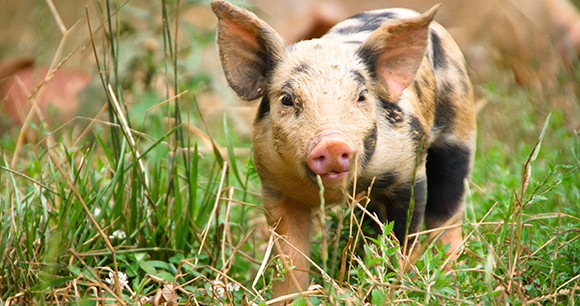
Washington, DC—The conference between the US House of Representatives and Senate to work out their differences on the Farm Bill (H.R. 2, Agriculture Improvement Act of 2018), has formally begun with the naming of each chamber’s conferees. In response, Animal Welfare Institute (AWI) President Cathy Liss released the following statement outlining the organization’s priorities for a final bill.
“AWI urges the conferees to craft a bipartisan Farm Bill that retains language advancing animal welfare but is free of the harmful riders present in the House version of H.R. 2,” said Liss.
AWI urges the inclusion of the following provisions in a final Farm Bill:
- Section 12503 of the Senate bill incorporates the Pet and Women Safety (PAWS) Act. The correlation between domestic violence and animal abuse is well documented. Abusers exploit the bond between their victims and companion animals to control, manipulate, frighten and punish their victims, many of whom will not leave their abusive situations out of fear for their pets. Few resources are currently available to assist these survivors, leaving many trapped in the cycle of abuse and manipulation. The PAWS language would make more resources available to help meet the housing needs of domestic violence survivors with pets, while providing law enforcement with additional tools to protect survivors from their abusers.
- Section 11613 of the House bill and Section 12521 of the Senate bill prohibit the slaughter of dogs and cats for human consumption. The killing of dogs and cats for human consumption is still legal in 44 states. While not a common practice, there are enough horrific examples associated with this trade to justify ending it. The provisions in both bills provide a much-needed tool against the brutality and public health dangers of the dog and cat meat trade and ensure that stolen pets or stray animals are not killed for this purpose. “We appreciate that both chambers addressed this cruelty,” said Liss, “but we believe the House language is stronger.”
- Section 11616 of the House bill, which extends the Animal Welfare Act (AWA) prohibition on animal fighting to US territories, was overwhelmingly agreed to by a vote of 359-51. Animal fighting is illegal in all 50 states, as well as the District of Columbia. However, cockfighting remains prevalent – and legal – in US territories. Section 11616 is needed to close this loophole and outlaw this cruel activity regardless of where it occurs.
AWI urges conference attendees to reject the inclusion of any of the following House provisions in the final Farm Bill package:
- Sections 11701 and 11702, also known as the King amendment, represent a badly conceived attempt to deny states the authority to set animal welfare standards within their own borders. Moreover, because the provisions are so broad, they are expected to have negative consequences not only for animal welfare but also for food safety, worker protections, environmental quality and consumer safeguards. In prior Farm Bill negotiations, similar ill-advised and constitutionally questionable language was removed, and we ask this conference to follow that lead.
- Section 8303 would exempt the US Forest Service and Bureau of Land Management from having to consult with the US Fish and Wildlife Service on how a proposed project may threaten a listed species or critical habitat. Interagency consultation under the Endangered Species Act (ESA) is crucial to ensure that projects minimize damage to vulnerable wildlife.
- Section 8503 provides the Forest Service with yet another exemption from the ESA. The agency would no longer be required to take into account potential harm to protected species when moving forward with a project.
- Section 9111 would exempt the Environmental Protection Agency from interagency consultation under the ESA before registering a pesticide, and Section 9114 would exempt the EPA, companies that have registered pesticides, and end users from liability under the ESA for harm to or the death of any listed species caused by pesticides. These sections would pose a particular danger to pollinators, which are critical to many crops.
“Further, AWI opposes any attempt to insert conference language that is in neither Farm Bill version, which would amend the AWA by extending the length of time research facilities registered with the US Department of Agriculture may operate without inspection. Amendments to do away with the one inspection per year required under the AWA were initially rejected for consideration, indicating that Congress recognizes the need for at least this minimal level of oversight.
According to Liss, “The AWA is a vital source of protection for animals used in experimental research. Requiring facilities to open their laboratories to inspection by USDA veterinarians is a small condition to attach to such use.”
Liss concluded, “It is our sincere hope that the conference committee will produce a bipartisan final bill that will improve animal welfare rather than put animals further at risk.”
Margie Fishman, (202) 446-2128, [email protected]